In both my documentation and parenthetical text references, page numbers citing the works of Niccolo Machiavelli (NM) refer to his Tutte Ie opere, ed. Mario Casella and Guido Mazzoni (Florence: G. Barbera, 1969). His works are abbreviated as follows:
All translations are my own.
PREFACE
Machiavelli as the principal character in his own thought: that is the theme of this collection of articles and essays. The articles are presented in formal dress, supported by footnotes, and the essays were written for occasions when the textual proof of ones statements is not expected or desired, and when arguing with authority is otiose. All begin from or come to Machiavellis strange suggestion that he was a prince. In describing princes, which he does in all his writings and not only in his most famous book, called The Prince, Machiavelli was explaining himself and his undertaking.
That strange suggestion is distinctive, but it is not original with me. It can be found in Leo Strausss Thoughts on Machiavelli, published in 1958, a work whose reception is related in . I have followed out Strausss general suggestion and some of the many, many specific points contained in that marvelous book.
Strauss combined two opposite reactions to Machiavellis work. The anti-Machiavellians, who after the publication of Machiavellis major works (posthumously, in 1531) sprang up angrily to defend morality and religion in politics, saw well enough that Machiavelli was the first philosopher not merely to lack respect for the just, the noble, and the sacred or even to show his lack of respectbut actually to advise all others to act without respect. Modern philosophers following Machiavelli, such as Bacon, Spinoza, Montesquieu, and Rousseau, showing regard like Machiavelli himself for the power of moral outrage, cautiously took notice of his responsibility for initiating the escape of philosophy, and thereafter society, from the superintendence of Christianity. But Strauss was the first to argue the point in detail while never losing sight of the question raised by Machiavellis immoralities and blasphemies.
Strausss book is open to the excitement of modernity at its origin and to the indignation of those who defend the tradition. It does justice to both. Most Machiavelli scholars of our time care for neither: they are not sufficiently impressed by Machiavellis innovation, and they excuse him for his immorality. They do not appreciate his innovation because, following him unconsciously, they excuse his immorality; and they excuse that because they do not see how far his innovation extends. They do not think that Machiavelli poses a question for us today. In this book I have tried to keep both sides of the coin in viewnot an easy task, since indignation blinds understanding and understanding tends to dissipate indignation.
When I say that Machiavelli is the principal character in his own thought, I do not mean to give him a postmodern gloss or a deconstruction. I do not mind if some are attracted to the self-referential character of his thought because it is fashionable to treat great thinkers as betraying themselves. But they should understand that Machiavelli will reveal himself only to those willing to listen to him, that is, to read his books attentively and even submissively. If they wish to find Machiavelli the prince, they must consider his intention. When Machiavelli speaks of his undertaking as an enterprise (la mia impresa), he does not refer to the horizon that marks the daily limits of his conventional thoughts or to a self-created Nietzschean perspective that he means to impose on us. His undertaking refers to what, in view of the truth about his situation, he means to do. His situation is the weakness of modern times, for which he has a political, not an aesthetic, remedy. The remedy is a great revolution in thought, to be followed by great changes in society. Since Machiavelli is mortal and cannot be everywhere even while he is alive, he will act through his books. He will rule from afar, although in a sense he will live as prince in the countries he conquers. He is not interested in, let alone preoccupied by, a job for himself. He is not primarily interested in saving Florence or in unifying Italy. He wants to defend the world against those who have caused it to become weak. Since he cannot rule directly, he will be the mastermind behind the operation, mastering future generations through his mind.
Machiavelli is a philosopher but not merely a contemplative one. He does not stop at observing, nor is he satisfied to indulge himself
All of Machiavellis writings, and every paragraph of them, have to be examined for their application to his own enterprise. In one instance, a chapter in The Prince (P 22) on those whom princes have as secretaries, the convergence between Machiavellis observations and his own state becomes almost obvious. (The way I used state in the previous sentence, as a realm of which some person or persons hold mastery, is explained in .) In the body of the chapter, the former Florentine secretary discusses the relationship between a prince and his minister, not secretary; and he gives just one examplethat of a minister with more brain than the prince. How can a prince in this delicate situation trust his minister? How can he avoid being deceived? Machiavelli supplies an infallible rule for deciding whom to trust that is in fact very deceptive. He says that a prince should take care that a minister thinks more of him than of himself, and that he should do this by loading him with honors, wealth, and burdens so that he does not desire change.
Machiavellis advice both denies and presupposes that the minister thinks of himself. It makes sense only when applied to Machiavelli, who is both minister and prince. As minister he advises princes and works on their behalf, but since he has the kind of brain that understands by itself, without others aid, he also directs them when he helps them. As minister, he thinks more of what is useful to princes than they do; as prince, he allows them, as his ministers, to be loaded with the worlds honors, wealth, and burdens. The ordinary princes accept Machiavellis advice because they can see it is to their advantage. They have no idea that they are in fact ministers to Machiavelli and that he rules them as their extraordinary prince.

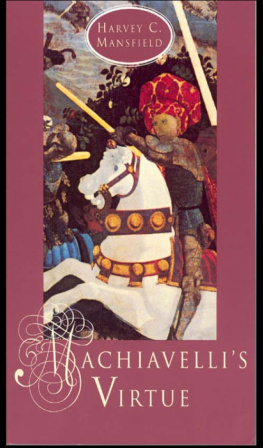




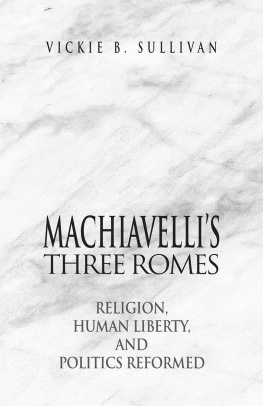
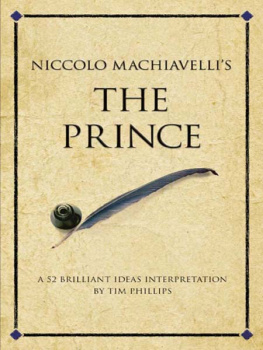
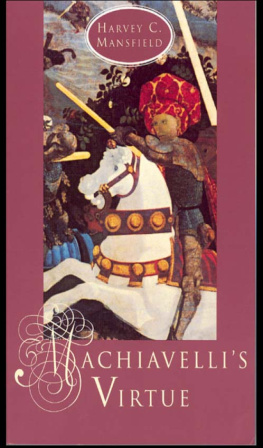
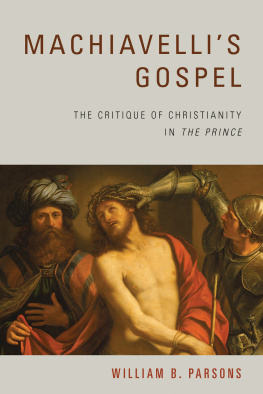
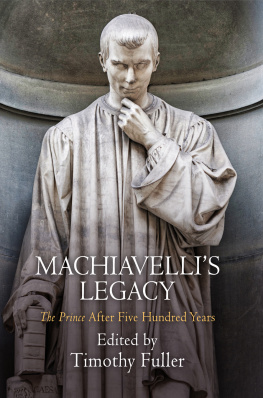
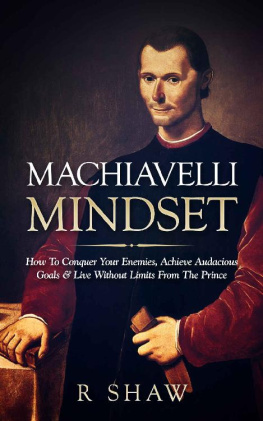
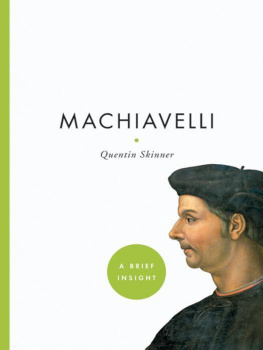
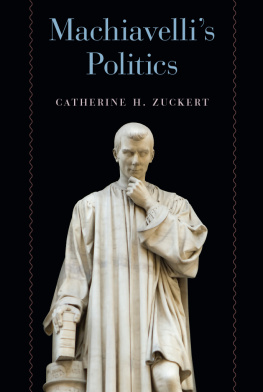
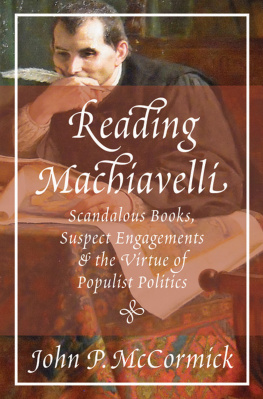
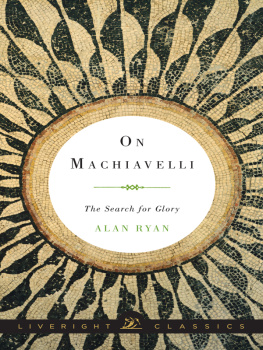

 The paper used in this publication meets the minimum requirements of the American National Standard for Information SciencesPermanence of Paper for Printed Library Materials, ANSI Z39.48-1992.
The paper used in this publication meets the minimum requirements of the American National Standard for Information SciencesPermanence of Paper for Printed Library Materials, ANSI Z39.48-1992.